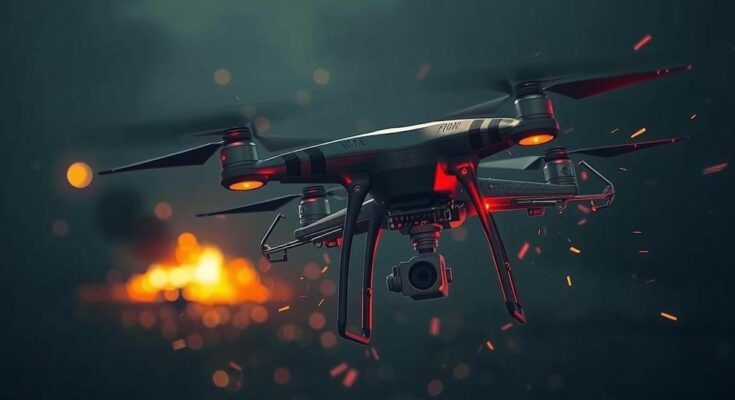The Sudanese army has accused the RSF of launching UAE-made drones from Chad amid escalating conflict. Evidence presented by Sudan’s Foreign Minister confirms these drones are linked to the UAE’s production and supposedly used against Sudanese territory. The UAE denies these allegations, which also connect to broader accusations of foreign involvement in Sudan’s humanitarian crisis. Since April 2023, conflict has resulted in significant casualties and displacement, prompting urgent calls for international response.
The Sudanese military government has accused the Rapid Support Forces (RSF), a paramilitary group, of utilizing drones reportedly assembled in the United Arab Emirates (UAE). Allegations surfaced following a presentation by Sudan’s Foreign Minister, Ali Youssef, who claimed that the RSF launched these drones from Chad to attack targets in Sudan, specifically El-Fasher and Omdurman. The military displayed photographic evidence purportedly showing these drones and the rockets involved in the assaults. Youssef emphasized that investigations indicate a clear link between the UAE’s drone assembly operations and the RSF’s activities in Chad, thereby intensifying existing concerns regarding the UAE’s role in Sudan’s precarious situation.
This allegation is not without precedent; in 2022, United Nations experts monitoring an arms embargo on Darfur corroborated concerns about the UAE supplying weapons to the RSF via Chad. The UAE has consistently refuted such claims, labeling them as unfounded. Within this broader context, Sudan’s UN ambassador has accused the UAE of exacerbating the conflict by providing arms to the RSF.
In light of these developments, Khalid Aleisir, Sudan’s media minister, condemned the actions of the RSF, suggesting that these incidents signify a grave assault on Sudan, implicating both Chad and the UAE. Aleisir characterized Chad’s involvement as a perilous escalation of the violence, criticizing external actors for their roles in prolonging the ongoing conflict. With the outbreak of war in April 2023, between the Sudanese army and the RSF, widespread devastation has ensued, resulting in tens of thousands of fatalities and over 11 million individuals displaced. This conflict has precipitated severe humanitarian crises, and both factions are facing serious allegations regarding war crimes, including indiscriminate attacks and ethnic cleansing.
The ongoing conflict in Sudan has its roots in a power struggle between the regular army, led by General Abdel Fattah al-Burhan, and the paramilitary RSF. The situation escalated into warfare in April 2023. The RSF is accused of engaging in hostilities that demand urgent global attention due to their humanitarian implications. The role of foreign powers, particularly the UAE, in supplying arms and facilitating operations via neighboring Chad complicates the conflict, leading to widespread allegations of war crimes from both sides. International scrutiny has focused on whether external interventions will further entrench conflict dynamics and exacerbate the humanitarian situation.
The allegations that the RSF is deploying UAE-made drones from Chad align with broader concerns regarding foreign involvement in Sudan’s conflict. As the Sudanese military government seeks accountability for these actions, the complex interplay of foreign arms support raises pressing questions about the international community’s role in either mitigating or exacerbating the crisis. With substantial casualties and displacement occurring since the onset of conflict, the urgency for coordinated humanitarian assistance increases amidst the ongoing hostilities.
Original Source: newscentral.africa




